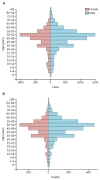Global burden of melioidosis in 2015: a systematic review and data synthesis
- PMID: 31285144
- PMCID: PMC6867904
- DOI: 10.1016/S1473-3099(19)30157-4
Global burden of melioidosis in 2015: a systematic review and data synthesis
Abstract
Background: Melioidosis is an infectious disease caused by the environmental bacterium Burkholderia pseudomallei. It is often fatal, with a high prevalence in tropical areas. Clinical presentation can vary from abscess formation to pneumonia and sepsis. We assessed the global burden of melioidosis, expressed in disability-adjusted life-years (DALYs), for 2015.
Methods: We did a systematic review of the peer-reviewed literature for human melioidosis cases between Jan 1, 1990, and Dec 31, 2015. Quantitative data for cases of melioidosis were extracted, including mortality, age, sex, infectious and post-infectious sequelae, antibiotic treatment, and symptom duration. These data were combined with established disability weights and expert panel discussions to construct an incidence-based disease model. The disease model was integrated with established global incidence and mortality estimates to calculate global melioidosis DALYs. The study is registered with PROSPERO, number CRD42018106372.
Findings: 2888 articles were screened, of which 475 eligible studies containing quantitative data were retained. Pneumonia, intra-abdominal abscess, and sepsis were the most common outcomes, with pneumonia occurring in 3633 (35·7%, 95% uncertainty interval [UI] 34·8-36·6) of 10 175 patients, intra-abdominal abscess in 1619 (18·3%, 17·5-19·1) of 8830 patients, and sepsis in 1526 (18·0%, 17·2-18·8) of 8469 patients. We estimate that in 2015, the global burden of melioidosis was 4·6 million DALYs (UI 3·2-6·6) or 84·3 per 100 000 people (57·5-120·0). Years of life lost accounted for 98·9% (UI 97·7-99·5) of the total DALYs, and years lived with disability accounted for 1·1% (0·5-2·3).
Interpretation: Melioidosis causes a larger disease burden than many other tropical diseases that are recognised as neglected, and so it should be reconsidered as a major neglected tropical disease.
Funding: European Society of Clinical Microbiology and Infectious Diseases (ESCMID) Research Grant 2018, AMC PhD Scholarship, The Netherlands Organisation for Scientific Research (NWO), H2020 Marie Skłodowska-Curie Innovative Training Network European Sepsis Academy.
Copyright © 2019 Elsevier Ltd. All rights reserved.
Conflict of interest statement
We declare that we have no conflicts of interest.
Figures



Comment in
-
Reducing the melioidosis burden: public health, chronic disease prevention, or improved case management?Lancet Infect Dis. 2019 Aug;19(8):800-802. doi: 10.1016/S1473-3099(19)30303-2. Epub 2019 Jul 5. Lancet Infect Dis. 2019. PMID: 31285142 No abstract available.
-
Melioidosis.Lancet Infect Dis. 2019 Oct;19(10):1056-1057. doi: 10.1016/S1473-3099(19)30480-3. Lancet Infect Dis. 2019. PMID: 31559958 No abstract available.
-
Melioidosis.Lancet Infect Dis. 2019 Oct;19(10):1057. doi: 10.1016/S1473-3099(19)30481-5. Lancet Infect Dis. 2019. PMID: 31559959 No abstract available.
References
Publication types
MeSH terms
Grants and funding
LinkOut - more resources
Full Text Sources
Research Materials

